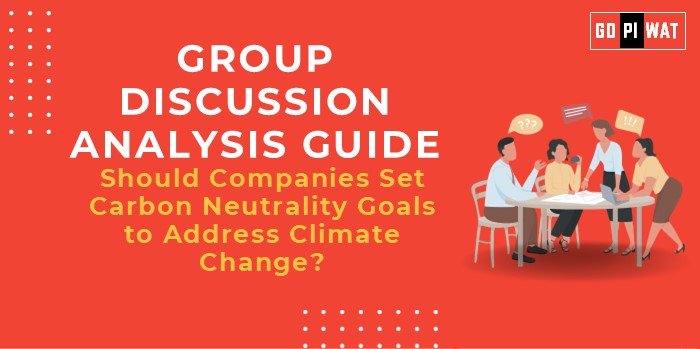🌍 Group Discussion Analysis Guide
📋 Topic: Should Companies Set Carbon Neutrality Goals to Address Climate Change?
🌟 Introduction to the Topic
Opening Context: Climate change is one of the greatest existential challenges of our time. Globally, corporations are under increasing scrutiny to adopt sustainable practices and lead the fight against carbon emissions.
Topic Background: The Paris Agreement (2015) marked a critical global pledge to limit global warming to 1.5°C. Carbon neutrality, or achieving net-zero emissions, is a significant part of this effort, pushing companies to offset emissions and adopt cleaner technologies. Companies like Microsoft and Google have already committed to ambitious carbon-neutral goals.
📊 Quick Facts and Key Statistics
- 🌍 Corporate activities contribute over 60% of global CO₂ emissions.
- 🏢 Over 33% of Fortune 500 companies have committed to achieving net-zero emissions by 2050.
- 📈 Transitioning to carbon neutrality can create 24 million new jobs globally by 2030 (ILO report).
- 🇮🇳 India aims to achieve net-zero emissions by 2070.
- 🌲 Microsoft became carbon negative by 2021 and plans to remove its historical emissions by 2050.
👥 Stakeholders and Their Roles
- Corporates: Adopt clean energy, reduce carbon footprints, and invest in R&D for sustainable technologies.
- Governments: Provide policy incentives, carbon credits, and regulations for sustainability goals.
- Investors: Encourage green investments and ESG compliance to prioritize climate-friendly businesses.
- Consumers: Support companies that promote sustainability through purchasing behavior.
- International Organizations: Monitor corporate sustainability (e.g., UNFCCC, IPCC) and provide frameworks like the Science-Based Targets Initiative (SBTi).
🎯 Achievements and Challenges
🏆 Achievements
- Leadership in technology: Microsoft and Google’s clean energy use has set global benchmarks.
- Policy push: Companies benefit from government incentives like carbon credits and green financing.
- Market competitiveness: 75% of consumers prefer eco-friendly brands (Nielsen).
- Innovation and R&D: Companies like Tesla (electric vehicles) and IKEA (renewable energy) have scalable solutions.
⚠️ Challenges
- High transition costs: Many small companies cannot afford carbon-neutral shifts.
- Greenwashing: Companies may claim sustainability for PR without implementing concrete plans.
- Lack of unified regulations: Global disparities in carbon pricing and policy enforcement hinder progress.
🌍 Global Comparisons
- Norway: Targets carbon neutrality by 2030 with heavy investments in renewable energy.
- USA: Large corporations, including Apple and Amazon, lead global carbon-neutral initiatives.
📚 Case Studies
- Microsoft: Achieved carbon negativity by 2021 through forest preservation and carbon capture technologies.
- Wipro: India-based company achieved carbon neutrality by 2014 through green infrastructure investments.
📖 Structured Arguments for Discussion
- Supporting Stance: “Setting carbon neutrality goals allows companies to mitigate environmental harm, build brand value, and align with global standards like the Paris Agreement.”
- Opposing Stance: “Carbon neutrality goals are expensive and impractical for small-to-medium enterprises and lack stringent enforcement mechanisms globally.”
- Balanced Perspective: “While carbon neutrality is critical, companies need gradual implementation strategies, strong policy support, and innovative solutions to ensure economic viability.”
✅ Effective Discussion Approaches
- Opening Approaches:
- Start with a global example: “Microsoft’s carbon negative status highlights the importance of proactive corporate responsibility.”
- Use data: “60% of global emissions come from corporate activities, proving why businesses must act now.”
- Counter-Argument Handling:
- Challenge: “Carbon neutrality is too costly.” Rebuttal: “In the long term, companies with sustainability goals attract more investors and consumers, creating economic value.”
- Challenge: “Greenwashing undermines efforts.” Rebuttal: “Transparent reporting and frameworks like SBTi ensure accountability.”
🔍 Strategic Analysis of Strengths and Weaknesses
💪 Strengths:
- Corporate leadership in innovation.
- Market demand for sustainable brands.
⚠️ Weaknesses:
- High costs for transition.
- Lack of policy standardization.
🌱 Opportunities:
- Green job creation.
- Investor preferences for ESG compliance.
⚡ Threats:
- Greenwashing risks.
- Economic disruptions.
🎓 Connecting with B-School Applications
- Real-World Applications:
- Corporate Finance: Role of green bonds and sustainability-linked loans.
- Operations: Implementing sustainable supply chains.
- Marketing: Building eco-friendly brand value.
- Sample Interview Questions:
- “How can companies balance sustainability goals and profitability?”
- “Evaluate the role of carbon credits in achieving carbon neutrality.”
- Insights for B-School Students:
- Aligning business goals with ESG compliance ensures long-term sustainability.
- Corporate leadership in climate action is critical for global economic stability.


